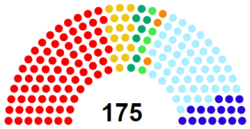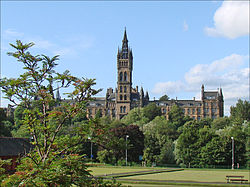Folketing
{[wip}}
Parliament of Crethia Folketing | |
|---|---|
| Type | |
| Type | |
| Leadership | |
Nessa Gordondoher since 21 May 2018 | |
| Structure | |
| Seats | 175 |
 | |
Political groups | Government (77) Social Democrats (S) (77) Supported by Liberal Party (Li) (15) Opposition Progressives (PKR) (52) National Alliance (NA) (16) Farmers' Party (La) (7) Green Party (G) (5) Lhaeraidd Interest Party (LIP) (3) |
| Elections | |
Last election | 11 May 2018 |
| Meeting place | |
 | |
| Folketing-Hos, Donhaven, Crethia | |
| Website | |
| folketing.kr | |
The Folketing (Crethian: Folketinget af Krøtin; lit. the people's thing), also known as the Crethian Parliament in Newreyan, is the supreme legislative body in Crethia. It alone possesses legislative supremacy and thereby ultimate power over all other political bodies in Crethia. Established in 1902, until 1968 the Folketing was the lower house of a bicameral parliament, called the Kongres; the upper house was Områdestinget. Its seat is Folketinget-Hos in Donhaven.
The Folketing passes all laws, approves the cabinet, and supervises the work of the government. It is also responsible for adopting the state's budgets and approving the state's accounts. Previously, the Områdestinget nominated the State President and the position was confirmed by the Folketing. However, following the abolition of the upper-chamber the office is now directly elected by universal suffrage every six years and can continuously remain in office for twelve years.
Members are democratically elected by proportional representation in elections held every four years. There is a 5% threshold for parties to enter the parliament. There are 175 seats, 88 of which are needed for a majority. Seats can be adjusted after the census if the government deems it necessary.
In recent years, it has been more common for coalition governments to form. However, more frequently minority governments form with a supply agreement from other parties. These agreements see the government supported for key votes, such as the nomination of the chancellor and cabinet approval. Minority governments then rely on individual legislators from other parties to pass legislation. The budget is passed by majority, however abstentions are allowed.